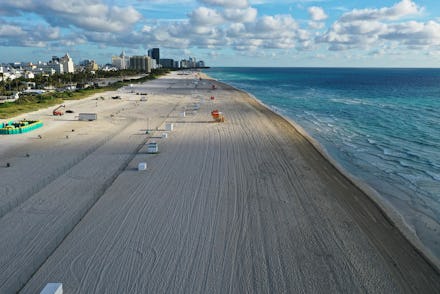Just weeks after viral spring break disaster, Florida's governor says beaches can reopen

Mere weeks after mayors across the state of Florida shuttered access to beaches in response to the criticism that they were enabling the spread of coronavirus, some of those same cities are reopening beachfronts for "essential" recreational purposes.
Florida Gov. Ron DeSantis (R) made the call Friday, saying the state's beaches could begin to reopen. Some restrictions will apply to the use of the beaches, said Jacksonville Mayor Lenny Curry (R). In a video, Curry said that limiting recreational use of parks and beaches to "essential" activities means that residents can run, walk, take care of pets, fish, or perform any other activity outlined in DeSantis's executive order, with the proper social distancing methods in place. (Then again, DeSantis previously deemed WWE wrestling essential, so "essential" may be a relative term.)
Jacksonville, located in Florida's Duval County, is the first city in the state to reopen its beaches. It was also one of the last to close them, only following the leadership of other cities who took the step first. Starting Friday, the Duval County beaches will be open from 6 a.m. to 11 a.m. and 5 p.m. to 8 p.m., but will remain closed during the day as well as in the late evening and overnight.
The limitation of beach use to certain activities mirrors what other states have put in place, like California, which says that residents can enjoy recreational activities as long as they stay 6 feet apart, as recommended by the Centers for Disease Control.
In March, despite the mounting evidence pointing to the need to closing public spaces and halt public gatherings in order to slow the spread of coronavirus, DeSantis refused to do so. The lack of action was especially concerning given the sizable elderly population in the state — people who are at greater risk of contracting the virus. Experts say that keeping the beaches open allowed for the virus to incubate particularly among the young people who flock to Florida for spring break, who then possibly carried the virus back to their home states; cases in California and Massachusetts have been linked to the Sunshine State.
It's been just about a month since President Trump declared a national state of emergency over the coronavirus outbreak, which helped to free up funds to tackle the virus's spread. But the inconsistent leadership, lack of federal support for individual states, and dubious claims about possible coronavirus treatments has confused Americans and led to vastly different levels of concern over the spread of coronavirus. That's why a state like Florida may start reopening its beaches April 17, while up the coast in New York, Gov. Andrew Cuomo (D) has extended his state's stay-at-home order until May 15.